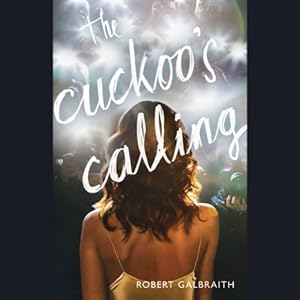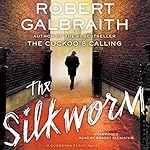Regulars of this blog know I like to have a soundbite comment about a book or a series that I can get out quickly and then let the patron let me know of I should go into more detail, or if I should get the next sound bite queued up.
So here is the line I have been using for the first book in the series, Cuckoo’s Calling: "This reads like classic, Noir PI mystery ala Raymond Chandler, but it is set in London, now."
Notice I did not mention the whole J K Rowling wrote it issue right up front. That is because it is not the main reason someone would enjoy this book or not. In fact, if you do mention it [and I usually do it as an aside at the end], make sure you let the reader know that there is NO magic in this series. Trust me. I explained the book to a patron as a Noir mystery and mentioned that the real author is Rowling, and she came back upset there was no magic.
Here is why someone would like the series though. While the mysteries are interesting and satisfying, it is Strike himself who is the reason you will enjoy these books. He is in the well worn style of the troubled PI. In this case, he is an Afghan War Vet, former MP, who has lost a leg. He is also semi-famous as the recognized illegitimate child of a Mick Jagger-esque rock star and his [now dead] groupie mom.
Strike is good hearted, but does not always make the best choices in his personal and professional life. He is driven by a sense of justice though, and will do anything to find a killer.
The character driven nature of this series is also enhanced by Strike’s assistant Robin. I don’t want to say much about her because her character really blooms in the second book, but I will say their work relationship is amusing and interesting to follow. And it is not sexual in anyway, which I really appreciated. I would read a story about Strike and Robin even if they weren’t solving a mystery together. In fact, the second book actually has a scene when the two of them go on a small road trip which is a great example of their relationship and why people love watching them interact.
London is also a character in the book. In the first novel, the victim is a famous it girl supermodel so we are taken in and out of glamour locales, while The Silkworm is all about the shady world of publishing. How much fun Rowling must have had writing about the price of fame and the dark underbelly of publishing too.
As I mentioned above, this book has an old-fashioned Noir feel. So it is atmospheric. There are meetings in dark corners, shady characters, and heaps moral ambiguity surrounding it all. But even with all of this atmosphere, the stories move well. They are not fast-paced due to the complexity of each case and the character driven nature of the narrative, but these are compelling novels that hook you early and keep you on the line, enjoying the ride as you are reeled in.
The writing here is also amazing, as one would expect. This is only a small example, but one of my favorite lines in the second book is [and I might be paraphrasing because I heard it while driving and had to wait until I parked to write it down]-- "A murder cannot be planned like a novel. Real life has too many loose ends.”
Finally, a note on the violence. These are gritty stories, but the murders are off stage. The dead bodies are described, and in The Silkworm, the method of death is pretty grotesque, but we are not there when any violence happens.
On a personal note, I loved these books. They were not perfect and both dragged a bit in the middle, but they were satisfying and interesting. There were lots of little details that were revealed throughout and came to be quite important in the end too. As a reader who loves a complex protagonist above all else, I couldn't get enough of Strike or Robin. Too bad it looks like 2016 until the next one though.
Narration Notes: I was not familiar with the narrator, Robert Glenister, but not only is he a frequent audiobook narrator, he is quite a well known British television star. But without knowing any of this, I was completely taken by his narration from the opening moments of the first book. Glenister inhabits Strike and is able to portray his complexity in a realistic manner, without sacrificing the story during the few times when he must narrate Robin’s thoughts too. Quite impressive.
Three Words That Describe These Books: atmospheric, character driven, compelling
Readalikes: The series that this reminds me most of, both for the complexity of the PI and the style of writing are the Kate Atkinson penned Jackson Brodie mysteries, all of which I have reviewed and discussed on the blog before. But quickly, both are a bit more literary in style, with a lovable but extremely flawed detective who appreciate the smart women who assist them.
As I mentioned above, the series has the old fashioned noir detective feel of a Raymond Chandler Marlowe story, but with a modern setting. So some readers may want to go back to the source and try some classic authors.
But that leaves out the modern part. So another character driven, atmospheric option is the crime and suspense novels of Denis Lehane, especially one like Mystic River or anything from his PI series. Like the Strike novels, Lehane’s stories are compelling and intricate crime stories with a strong sense of place [Boston for Lehane] with the underlying issue of emotional scars and fantastic charcaterization. I often give out any Lehane book to a crime fiction fan looking for a “new, good read,” and the Strike novels are starting to fill that niche too.











No comments:
Post a Comment